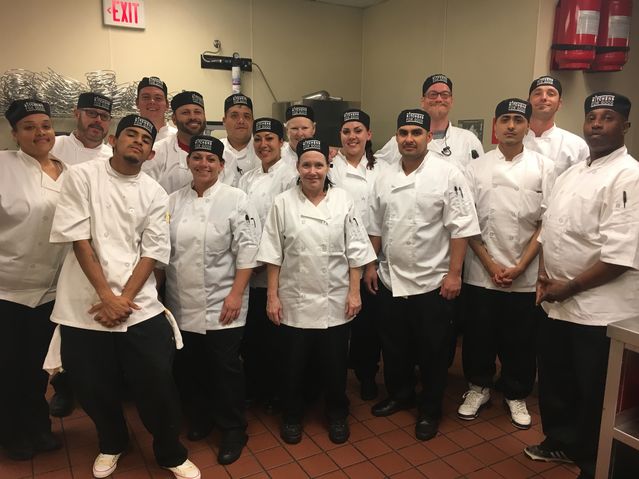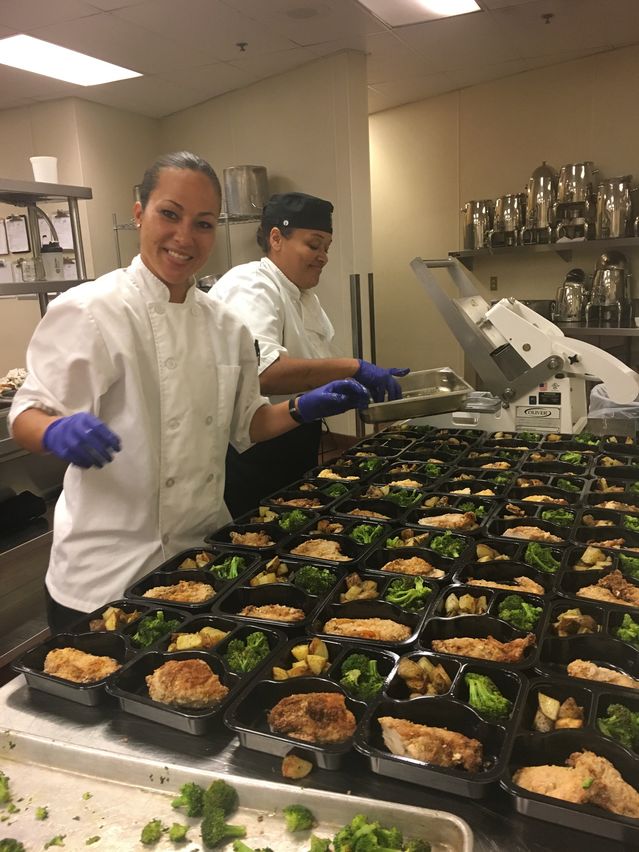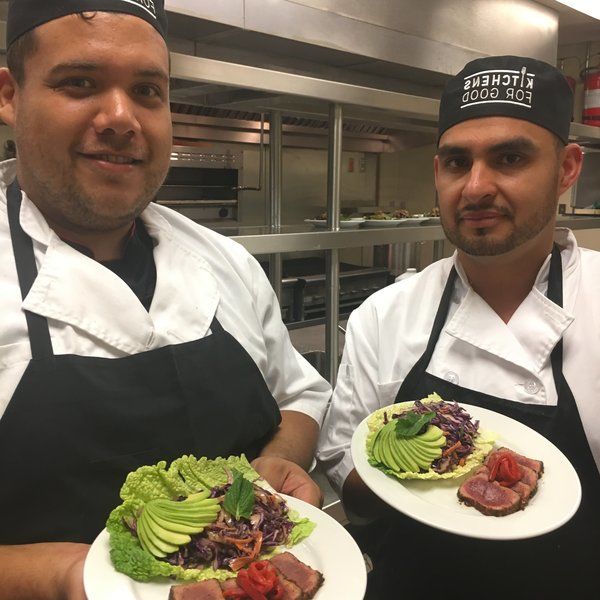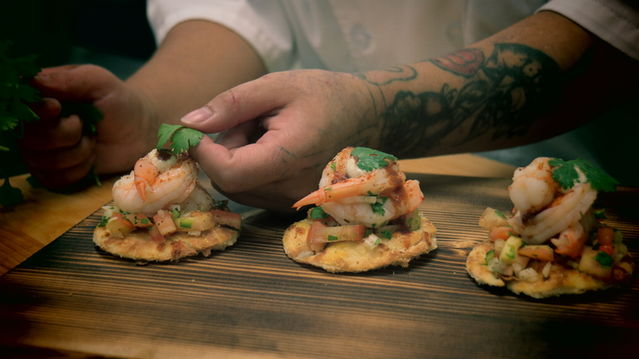
Appetite
Kitchens For Good Is Cooking Up Second Chances
This non-profit transforms lives while fighting poverty, hunger and food waste
Posted August 17, 2017

I sat down to orange glazed salmon, crispy chicken with basil cream sauce, beef tips with mushrooms, zucchini and carrot spirals with tomato fennel jam, and more exquisite delights than seemed possible. Was I at a fancy new restaurant? I was at a place even better as these gourmet offerings were served up with overflowing portions of restored hope and unlimited vision. I had just witnessed the emotional graduation ceremony at Kitchens For Good, a place where individuals once convicted and hopeless were given a second chance, and now stood as proud graduates of the Project Launch Culinary Apprenticeship Program. The celebration luncheon had been fittingly prepared by the graduates themselves. Kitchens For Good is a San Diego non-profit organization with an ambitious multi-tiered mission of breaking the cycle of food waste, poverty, and hunger, while training people previously incarcerated and often considered unemployable to flourish in the culinary arts. The program also accepts youth aging out of foster care, victims of domestic abuse, and homeless individuals fighting addiction or mental health issues.
In a rousing commencement opening, Chuck Samuelson, the Founder and President of Kitchens For Good, congratulated the students on completing a rigorous 12-week culinary training program where they were not only taught food preparation, but workforce and life skills. “From knife skills to life skills” is a catchy phrase of the program. Students are provided with resume writing, interviewing techniques financial literacy, and internship and job placement services upon graduation. One former graduate said it best when she thanked the program for replacing her defeating thoughts of, “I have a felony, to we WILL find you a job.”
Samuelson understands the meaning of struggle and credits the skills he learned working in kitchens for giving him a way up. Growing up as one of nine children with a single mother, he began washing dishes at age 13 to help support the family, and eventually dropped out of high school to care for younger siblings and to continue furnishing income. He found his path in the restaurant industry, rising from dishwasher to executive chef, to owner of restaurants and catering businesses. While working at premiere restaurants, Samuelson was shocked at the tremendous amount of food being wasted daily. Finding it unacceptable that in the United States, 40% of edible food goes to waste, costing more than $165 billion per year, Samuelson envisioned a way to stop landfills from being needlessly flooded with edible food, and to bring that food to hungry people. Kitchens For Good was born in 2014, with a firm belief kitchens can be economic engines for good in their communities. The non-profit not only addresses the immediate needs of hunger, but tackles the root cause of hunger – poverty – through its innovative workforce training programs.
Kitchens For Good rescues and purchases surplus food and cosmetically imperfect produce and products from farmers and wholesalers. Students in the culinary program transform the raw ingredients into nutritious meals and products which are delivered to those in need. From 2015-2017, their Project Nourish Program has provided 33,882 meals to homebound seniors, at-risk-youth, after school programs, food pantries, senior centers, and other social service providers.

Not relying solely on philanthropy, Kitchens For Good ensures its own sustainability through their catering program, contract meal services, and retail products. The fiscal year of 2016-2017 alone, brought earned revenue of $1,428.801. They catered 583 events, from corporate meetings to fine weddings. Homemade jams and freshly canned produce are sold at farmer’s markets. All profits are reinvested back into their social programs.


As the graduation ceremony continued, Aviva Paley stepped to the podium, with an optimism shining as bright as her yellow dress. The director of programs and development described how she is frequently asked what she does for a living. She responds by saying she runs a culinary school for people coming out of prison. Initial reactions are varied, but she has often heard “Aren’t you afraid?” Through these conversations she realizes it is easy to pass judgment, but at Kitchens For Good, judgment does not exist and compassion will always be a main ingredient. Paley said she has seen people who once had destruction and violence in their lives make radical changes, to purposeful, productive lives. The transformation and changes are real she proclaimed.
A transformed life is exactly what one grateful graduate achieved. Chosen as a class speaker, he told of his life as a United States combat veteran. Eight years of duty, including three years in Iraq, brought him home broken from all he had seen. Unable to deal with the haunting visions of death, he turned to methamphetamine to numb his pain. This led him into a downward spiral of addiction and drug dealing, landing him in and out of prison for the next 16 years. The personal devastation was high: two marriages destroyed, his three children growing up without their father, and the loss of dignity and respect for himself. At his last conviction, before he was sentenced to a lengthy prison term, the prosecutor told the judge he was “a menace to society.”
Salvation came to him two-fold while in prison. First through the compassionate Sister Teresa, who taught him how to finally take responsibility for his actions and to heal. And second through a culinary program where he fell in love with baking. Upon his release from prison, he was accepted into Kitchens For Good, is now employed as a baker, and has been accepted into a renowned culinary school. One recent day, he received a letter from the prosecutor he had last seen at his sentencing. Initially afraid to open the letter, envisioning handcuffs popping out, he was moved to find a note of congratulations, with the message his story will inspire others. With deep emotion, he thanked Kitchens For Good for helping him change his label.
The next class speaker was a woman who at the age of 49 found herself homeless, lost, and forgotten. Using all her energy to survive on the streets, she too turned to drugs to ease the pain of loneliness and hopelessness. Her turning point came when she saw her daughter mirroring her life. She knew she had to change. She entered the program at Kitchens For Good with the burning need for someone to believe in her. She said she was given a second chance, a lot of hope, and is embracing the future without fear. She dreams of one day owning her own bakery.
As I walked toward the celebration banquet, the jubilant words of one former graduate replayed in my mind. “Let your dreams be bigger than your fears. Anything is possible!” Kitchens For Good is truly a place where giving back has never tasted so good.
If you would like to learn more about Kitchens For Good, please visit their website at: http://kitchensforgood.org
Aleida K. Wahn’s Website is: www.aleidalaw.com



